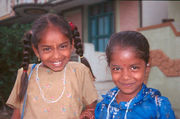Child
2007 Schools Wikipedia Selection. Related subjects: Health and medicine
A child (plural: children). Precise definitions vary; is the offspring, of any age, of two people. The American Heritage Dictionary defined a child as an individual who has not yet reached puberty.
The term "child" is also a counterpart of parent: adults are the children of their parents despite their maturation beyond infancy; for example "Benjamin, aged 46, is the child of Tobias, aged 73". Similarly in a generalized sense, see child node.
Legal definition of child
The Convention on the Rights of the Child defines a child as "every human being below the age of 18 years unless under the law applicable to the child, majority is attained earlier".
Development

Child development is the study or examination of processes and mechanisms that operate during the physical and mental development of an infant into an adult. Pediatrics is the branch of medicine relating to the care of children. It encompasses ages from prenatal to teenagers and even young adults (ages 0-21 years).
Terms for stages of age-related physical development are listed below. Approximate age ranges are shown, but conceptions about the boundaries between different stages of life vary between cultures and periods. The age ranges and terms listed reflect 21st century conceptions in the developed world.
- Zygote, the point of Conception, fertilization
- Embryo; in the later stages also called fetus
- Birth
- Child:
- Infant (baby) (ages 0 - 1.5)
- Neonate (newborn) in the first month of life
- Toddler (ages 1.5 - 4)
- Middle childhood (schoolchild (or schoolboy or schoolgirl)) - Primary school/Elementary school age (ages 4 - 11)
- prepubescence, a subset of the above (ages 10 - 11, approximately)
- Preadolescence (preteen, or late childhood) - in the United States, middle school age (ages 11 - 13, approximately. Note overlap with prepubesent stage of middle childhood.)
- Infant (baby) (ages 0 - 1.5)
- Adolescence and puberty (teenager) (14-20)
- Young adult (18-25)
- Adult (starts at age 18-21 or older; exact minimum age may vary)
- Early adulthood (21-32)
- Middle age (33-54)
- Advanced adult/ Senior citizen (55+)
- Death (occurs at various ages depending on person)
Also sometimes used are terms that specify one's age in decades, such as:
- Twenty something (20-29)
- Thirty something (30-39)
- Forty something/Quadragenarian (rarely used since 1980)(40-49)
- Quinquagenarian (50-59)
- Sexagenarian (60-69)
- Septuagenarian (70-79)
- Octogenarian (80-89)
- Nonagenarian (90-99)
- Centenarian (100-109)
- Supercentenarian (110+)
Cognitive development
- Learning
- Music lessons
- Infant Education
- Language acquisition
- Developmental psychology
- Child art
Notable child prodigies
- Christian Friedrich Heinecken (The Infant of Lübeck)
- Isaac Albéniz
- Wolfgang Amadeus Mozart
- Sarah Chang
- Tiger Woods
Human development
Human development refers to all forms of development above, often in the context of clinical or developmental psychology, or as human development theory (in economics, an outgrowth of welfare economics).
Both the psychological and economic fields share a special concern with education and language fluency including literacy and numeracy, and with identification and development of more unique talents into the economic variable known as individual capital.
Earlier branches of economics see humans in terms of labour for production, means of persuasion or protection, which tend to be skills acquired only in adolescence and adulthood. The human development view is more evident in sports, music and other performing arts, such as acting where the child begins training often as early as three years of age. A contemporary example is Tiger Woods and his early training in golfing.
Children are often targeted at for advertising, as many people, including Eric Schlosser, have told the world via books.
While there are problems with such early "streaming", child murder, child abandonment, military use of children and other major social ills are thought to be reduced by a human development approach – as there is a high value assigned to children by the state.
The UN Human Development Index is a means of measuring well-being used to rank states by these criteria.


